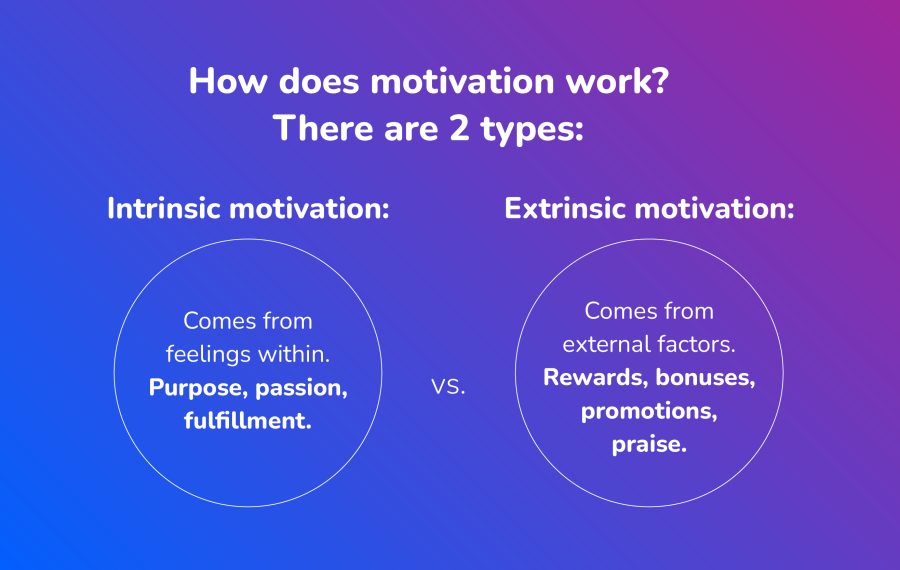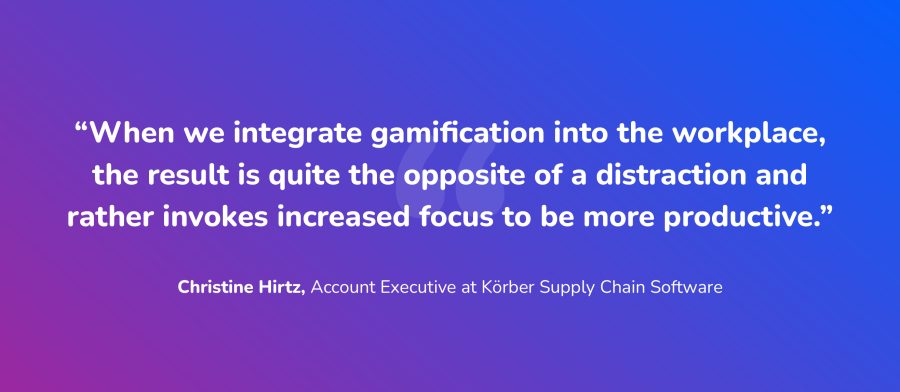Learn what motivates employees and how strategies like gamification, recognition, and professional development can boost engagement and performance.

Back to Blog
People make the world move – and the same principle applies to businesses. A great business is built based on a good strategy, but also on an engaged and motivated workforce. Unfortunately, this has become rarer than ever.
According to a Gallup study, only 23% of employees report being engaged in their workplace, with 15% reporting active disengagement. This is bad news for businesses in several areas, considering that employee motivation and engagement has a direct impact on results. Actually, companies with highly engaged workforces can be 21% more profitable (Gallup) – makes you think, right?
Understanding the motivational factors that inspire team members can help organizations improve employee engagement, enhance the employee experience, and retain top talent.
In this article, we’ll explore key drivers of motivation and how strategies like gamification, professional development, and recognition programs can create an environment where people feel valued and empowered.
Motivating employees starts with understanding what drives them. There are two main sources of motivation: intrinsic factors and extrinsic factors.
Intrinsic motivation stems from within, driven by a sense of purpose, passion, or fulfillment in work. Employees motivated intrinsically are engaged because they find their tasks meaningful and rewarding.
Extrinsic motivation comes from external rewards like bonuses, promotions, or praise. While it’s essential for short-term goals, intrinsic motivation fosters long-term engagement and satisfaction.
Balancing both types of motivation helps create a high-level strategy for improving employee engagement and fostering a culture where employees feel appreciated.

In a recent podcast collaboration between vaibe and Zebra Technologies – a leading provider of enterprise asset intelligence solutions and vaibe’s Independent Software Vendor (ISV) partner – Nick Retzmann, vaibe’s Chief Growth and Product Officer, discussed the effectiveness of gamification in motivating employees, particularly within the supply chain sector.
He noted, “Workers like tracking their performance and competing with each other to achieve better results. It triggers the same aspect in the brain as video games and adds another layer of motivation.”
Gamification applies game mechanics, such as competition, rewards, and achievements, to non-game scenarios like supply chain performance management. By transforming tasks into engaging challenges, gamification stimulates employees’ intrinsic motivation, making routine tasks more exciting and fostering a culture of continuous improvement.
A study by Lucas Systems found that 84% of warehouse workers are enticed by gamification, indicating its potential to drive employee engagement in supply chain operations.
By integrating gamification strategies, companies can enhance employee motivation and performance, leading to increased efficiency and productivity in supply chain processes.
By incorporating game elements into work, companies can turn routine tasks into exciting challenges. “Work is work, but why not turn work into fun?”, says Nick, explaining that this is the message that vaibe wants to transmit to its customers and their employees.
Zebra’s pocast had the participation of Mark Butler, from Zebra Technologies, Nick Retzmann, Chief Growth and Product Officer at vaibe, Tiago Sottomayor, Chief Technology Officer at vaibe, and Christine Hirtz, a Key Account Executive with Körber Supply Chain Software.
Gamification has become a powerful tool for driving employee engagement, boosting productivity, and enhancing overall business performance. By integrating game-like elements into the workplace, businesses can motivate their teams, foster healthy competition, and create a more rewarding work environment.
From engaging challenges and leaderboards to rewards and badges, gamification taps into employees’ intrinsic motivations, making work more interactive and fulfilling.
vaibe, with its API-based Gamification-as-a-Service platform, allows businesses to implement these strategies seamlessly, creating a personalized, scalable approach to improving employee motivation.
When creating new gamification features, vaibe relies on data and testing to see what it works best. It also leverages the psychology of rewards, using extrinsic and intrinsic motivators. Extrinsic elements, like prices and recognition, and intrinsic elements, like personal satisfaction, are the type of motivators that can engage employees in their workplace.
“The new generation of employees, generation Z, are used to playing on their mobile phones. Gamification is all around us, and we are using exactly these elements to gamify work environments”, says Nick.
When vaibe’s gamification solution is implemented, it’s not just based on what the tool offers – it also takes into account the company’s and its employees’ characteristics, to make sure the gaming elements align with the goals of the work itself.
“To understand what works, we try to understand the employees and what drives them. The games must be engaging, enjoyable – because forced fun is not fun”, says Nick, who believes that gamification is the competitive edge the recruitment industry, and companies overall, need nowadays.
“If a company wants to stay competitive, in the recruitment but also with their current employees, they need to implement innovative solutions, such as gamification”, he adds.
Recognition is a fundamental motivational factor. Acknowledging employees’ hard work, while giving them frequent and constructive feedback, not only helps employees improve but also ensures they feel heard and appreciated, improving employee morale and driving higher productivity levels.
Effective recognition programs ensure people feel valued for their contributions, boosting loyalty and fostering a positive employee experience. And with feedback, opportunities for growth are also on the table, which are beneficial for the employee and for the company as well.
A feedback-driven approach improves employee motivation and engagement by providing clarity on expectations and areas of improvement, encouraging open communication, fostering trust, and strengthening company culture.
When employees are recognized and receive good feedback, they expect to also be given growth opportunities to achieve even better results – motivation always drives more motivation.
Professional development opportunities, such as training sessions, mentorship, or tuition assistance, show employees that the organization values their long-term success.
When employees can see a clear path for advancement, they remain committed and motivated to excel in their roles.
Modern tools like vaibe’s gamification solution help companies analyze the effectiveness of their motivational strategies.
By tracking employee engagement levels, reward usage, and participation rates, organizations can make data-driven adjustments to their programs. This ensures that the motivational strategies align with the team’s evolving needs, delivering a higher level of success.

Engagement tools like gamification aren’t just for office jobs, they can also be highly effective in blue-collar roles. Recognizing this opportunity, Körber Supply Chain, in collaboration with vaibe, is introducing “Körber Gamification, brought to you by vaibe” to enhance employee motivation and efficiency in warehouse operations.
Repetitive tasks in supply chain operations can sometimes lead to disengagement and low productivity. By incorporating gamification into its Warehouse Management Systems (WMS), Körber Supply Chain Software transforms routine processes into engaging activities that encourage employees to stay focused and motivated.
“Supply chain tasks are very important, but not always that exciting. Gamification can be a valuable solution to encourage and motivate employees to be more productive and to have more fun in the workplace”, says Christine Hirtz, Account Executive at Körber Supply Chain Software.
Keeping the workforce motivated is essential for any business’s success. Now more than ever, companies need to evaluate their workforce and find ways to keep their employees engaged.
Ready to put these strategies into action? Get started with vaibe’s gamification tool. If you believe work should be engaging and fulfilling, explore the gamification elements vaibe brings to the workplace—from challenges and leaderboards to rewards.
Request your demo today and be part of vaibe’s mission to empower and motivate workforces worldwide.
Boost workplace motivation with these actionable employee engagement ideas to drive productivity in 2025.
Understand how to immediately start boosting business productivity with gamification tools that drive real results.
Learn effective strategies to boost employee engagement, retention, and workplace satisfaction.